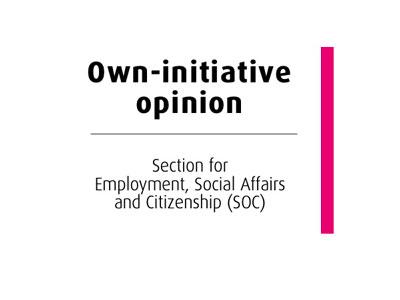European Economic
and Social Committee
The climate crisis and its effect on vulnerable groups
Background:
Vulnerable groups are set to pay a disproportionately high price for the climate crisis and will be hit hard by its effects due to policy failures at national, European and global levels and because they have fewer resources at their disposal to fight the consequences of climate change and adapt to new circumstances.
Women, and especially women living in the Global South, will be one of the most disadvantaged population groups. Their access to employment, income stability, living standards and job security will be hampered by the economic disruption that the climate crisis is likely to cause.
Agriculture workers and farmers are also likely to face unprecedented challenges such as desertification and water stress – threats that loom over the Mediterranean and the major agricultural regions of Central and Eastern Europe. In the south of Europe, declining rainfall levels and unsustainable water management will most likely lead to critical water shortages.
The urban poor population will also see their living conditions decline, as they lack the resources and skills to address the challenges they face.
Persons with disabilities, the elderly, indigenous communities, children, immigrants, minorities – the list of vulnerable groups affected by climate change is long and clearly shows the importance of action to achieve a socially just transition.
Key points:
The EESC:
- calls for the development of a comprehensive EU political and social strategy that would boost the EU's capacity to respond in a proactive rather than reactive manner to climate emergencies. The Climate Adjustment Fund has the potential to emerge as a tool of paramount importance in that respect, accompanied by the Cohesion Fund, the Just Transition Fund and the Recovery and Resilience Facility;
- recommends highlighting the social aspects of the just transition, with an emphasis on children and intergenerational justice, and supplementing initiatives such as the EU Social Climate Fund and the EU Climate Adjustment Fund with additional instruments. It also suggests investigating how climate change and the shift to green energy might worsen current social and environmental injustices, by examining the connection between climate change effects, vulnerable communities, and social inequalities;
- stresses the need to provide vulnerable groups with opportunities to acquire skills that are valuable in the green economy and that can prevent energy poverty.
The text of the draft opinion can be found here.
Additional information
Section: Employment, Social Affairs and Citizenship (SOC)
Opinion number: SOC/770
Opinion type: own-initiative opinion
Rapporteur: Ioannis Vardakastanis
Reference: Rule 52(2) of the Rules of Procedure
Date of adoption by section: 21/11/2023
Result of the vote: 69 in favour/0 against/1 abstention
Date of adoption in plenary: 13/12/2023
Result of the vote:
Contacts:
Press officer: Laura Lui
Tel.: 00 32 2 546 9189
email: laurairena.lui@eesc.europa.eu
Press officer assistant: Alexandra Brihaye
email: Alexandra.brihaye@eesc.europa.eu
Administrator: Valeria Atzori
Tel.: +32 25468774
